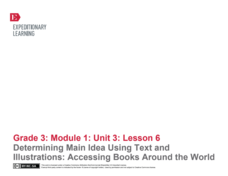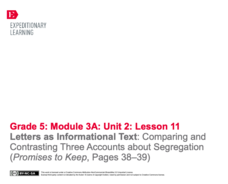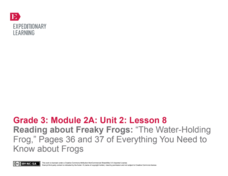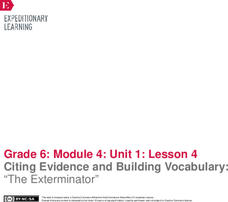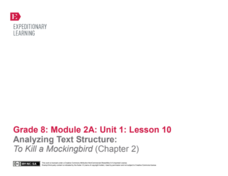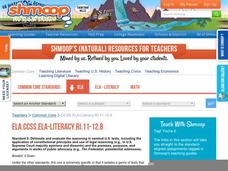EngageNY
Informational Text Features: Analyzing “Hawaii’s Endangered Happy Face Spider”
Some things are better the second time around. Scholars reread an article about Hawaii's happy face spider, answering text-dependent questions as they read. Then, they use a Venn diagram to compare the text features of interviews and...
EngageNY
Identifying How Text Features Support Arguments: “The Exterminator"
Half and half. Split the class in half to gain a full understanding of sidebars. Pupils work in groups to discuss sidebars in text. Half of the groups read Seriously Sick, and the other half reads Killer Genes. They read using...
Hood River County School District
Text Structure: Features and Organization
Teach learners how to interact with both fiction and non-fiction text with a packet of activities and worksheets. After looking over text structure and the difference in text features between different types of writing,...
Ontario
Reading Informational Text
Learning to recognize the importance of the features of information text (i.e., titles, subtitles, endnotes, sidebars, etc.) is the focus of a reading activity designed for middle schoolers. Learners examine how these text features...
EngageNY
Determining Main Idea Using Text and Illustrations: Accessing Books Around the World
Ease into informational text with the lesson suggested here. Part of a unit series, the lesson draws from previous lessons and acts as a natural moment to add in informational text. Class members read one section of My Librarian is a...
Roseburg Public Schools
Library Skills and Literature
The library is such a valuable resource for kids of all ages. Help elementary readers learn all about parts of the library, text features for both fiction and nonfiction text, and different ways to find books that they want to read.
Ontario
Reading Graphic Text
Do students really need to be taught how to read cartoons, comic books, and comic strips? Yes. Just as they need to learn how to read other forms of graphic text such as diagrams, photos, timetables, maps, charts, and tables. Young...
EngageNY
Gathering Evidence and Drafting a Two-Voice Poem (Chapter 13: "Los Duraznos/Peaches")
Begin class with a short comprehension quiz and review and then move into a new genre: two-voice poems. The activity provides information about this type of poetry as well as a video example made by eighth graders that you can show your...
EngageNY
Letters as Informational Text: Comparing and Contrasting Three Accounts about Segregation (Promises to Keep, Pages 38–39)
Letters ... a lost art or good resource? Scholars add letter writing to their informational text chart and describe the features of a letter. They then look at page 38 in Promises to Keep and complete a Perspectives Venn...
EngageNY
Comparing and Contrasting Two Texts about Poison Dart Frogs: Eggs and Tadpoles
Poison Dart Frog babies are the focus of a instructional activity that challenges scholars to compare and contrast two informational texts. Beginning with a read-aloud, followed by a discussion, readers complete a practice page that...
EngageNY
Analyzing the Features of a Newspaper Article
There's more to newspaper articles than meets the eye. Scholars learn the different features of a newspaper article, including headline, byline, subheadings, etc. Pupils circle the features in an article as the teacher discusses their...
EngageNY
Reading about Freaky Frogs: “The Water-Holding Frog"
Boost reading comprehension skills with a lesson all about freaky frogs. A poem hooks scholars and takes them into a reading of an informational text followed by peer discussions. A three-page worksheet focuses on text features and...
National Council of Teachers of English
Writing Acrostic Poems with Thematically Related Texts in the Content Areas
Scholars scour thematically aligned texts to gather a bank of words they can use in an original acrostic poem.
EngageNY
Analyzing the Features of an Informative Consumer Guide
Analyze, strategize, synthesize! Scholars analyze informative consumer guides to determine what features to include in their own guides. Next, pupils select charts and images to use in their guides.
National Council of Teachers of English
Timelines and Texts: Motivating Students to Read Nonfiction
With the emphasis on incorporating more nonfiction in language arts classes the question arises about how to design activities that motivate kids to engage with informational text. How about an assignment that asks class members to...
Curated OER
Creating a Newspaper
Get the scoop with a fun, engaging newspaper project. After analyzing the parts of a newspaper, including the headline, subtitles, and pictures or images, young journalists get to work by writing their own stories in a newspaper article...
EngageNY
Citing Evidence and Building Vocabulary: “The Exterminator”
It is an out-of-body experience. Scholars take a look at the sidebars outside the body of the text in The Exterminator. They discuss the purpose of this type of text feature and work to determine the gist. Learners write unfamiliar...
EngageNY
Reading about Freaky Frogs: “The Glass Frog”
Freaky frogs are the focus of a lesson plan designed to boost reading comprehension skills using text features and asking and answering questions. Informational text and a poem supply scholars with animal-related vocabulary and facts. A...
EngageNY
Analyzing Text Structure: To Kill a Mockingbird (Chapter 2)
Scholars use the Narrative Structure graphic organizer to analyze the structure of the smaller stories within To Kill a Mockingbird. They talk with a partner to discuss how the structure adds meaning.
Core Knowledge Foundation
The History of the Earth Tell It Again!™ Read-Aloud Anthology
A read-aloud anthology focuses on Earth's history. Over three weeks, young scholars listen to and discuss stories about the layers of the Earth, minerals, fossils, different kinds of rocks, and dinosaurs. After the lesson's text, each...
Media Education Lab
Propaganda in Context
"Board Game Helps Fight Real World Ebola," a video produced by Voice of America, provides the text for a guided instructional activity that asks viewers to analyze the propaganda techniques used in the video. Groups then select a example...
EngageNY
Introduction: The Ideas of Charles Darwin
Piece by piece ... Scholars read the text World without Fish by breaking the text into pieces. They identify challenging words and determine the gist of each section as they read. They then work together in triads to answer...
EngageNY
Reading about Freaky Frogs: “The Amazon Horned Frog"
The Amazon Horned Frog is the focus of a activity designed to encourage readers to ask and answer questions. A frog-themed poem opens the door to a whole-group discussion. Following a read-aloud of an informational text, a three-page...
Shmoop
ELA.CCSS.ELA-Literacy.RI.11-12.8
It is no easy feat to wade through legal and political documents. And incorporating this type of informational text into a literature class can also be a challenge. Here’s a resource that includes suggestions for how to address this...
Other popular searches
- Non Fiction Text Features
- Informational Text Features
- Text Features Worksheets
- Non Fiction Text Features
- Identifying Text Features
- Functional Text Features
- Using Text Features
- Expository Text Features
- Fictional Text Features
- Reading Using Text Features
- Electronic Text Features
- Identify Text Features




